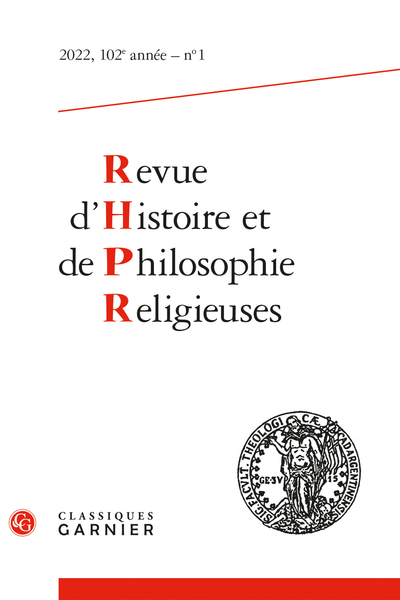
Résumés
- Type de publication : Article de revue
- Revue : Revue d'Histoire et de Philosophie religieuses
2022, 102e année, n° 1. varia - Pages : 135 à 137
- Revue : Revue d'Histoire et de Philosophie religieuses
- Thème CLIL : 4046 -- RELIGION -- Christianisme -- Théologie
- EAN : 9782406129776
- ISBN : 978-2-406-12977-6
- ISSN : 2269-479X
- DOI : 10.48611/isbn.978-2-406-12977-6.p.0135
- Éditeur : Classiques Garnier
- Mise en ligne : 16/03/2022
- Périodicité : Trimestrielle
- Langues : Français, Anglais
Résumés/Abstracts
Matthieu Arnold, « Laudatio du professeur Irene Dingel à l’occasion de son Doctorat honoris causa »
Laudatio du professeur Irene Dingel, directrice du Leibniz-Institut für Europäische Geschichte (Mayence), prononcée à l’occasion de l’attribution du doctorat honoris causa de l’Université de Strasbourg (17 novembre 2021).
Mots-clés : controverse théologique, Églises, Europe, Institut d’Histoire Européenne (Mayence), Irene Dingel, paix religieuse, Réformation.
Matthieu Arnold, “Laudatio for Professor Irene Dingel on the Occasion of the Award of an Honorary Doctorate”
Laudatio for Professor Irene Dingel, Director of the Leibniz-Institut für Europäische Geschichte (Mainz), delivered on the occasion of the award of an honorary doctorate by the University of Strasbourg (17 November 2021).
Keywords: theological controversy, Churches, Europe, Institute for European History (Mainz), Irene Dingel, religious peace, Reformation.
Irene Dingel, « Réponse à la laudatio »
Réponse du professeur Irene Dingel à la laudatio prononcée à l’occasion de l’attribution du doctorat honoris causa de l’Université de Strasbourg (17 novembre 2021).
Mots-clés : controverse, Europe, Institut d’histoire européenne (Mayence), organisation de la recherche, paix de religion, Réformation, tolérance religieuse.
Irene Dingel, “Response to the Laudatio”
Professor Irene Dingel’s response to the laudatio delivered on the occasion of the award of an honorary doctorate of the University of Strasbourg (17 November 2021).
Keywords: controversy, Europe, Institute for European History (Mainz), research organization, religious peace, Reformation, religious tolerance.
136Théophile Mallo, Annemarie Lienhard et Marc Lienhard, « Wolfaria d’Eberlin von Günzburg, première utopie protestante ? Les Xe et XIe Confédérés »
Le présent texte, traduit et commenté pour la première fois en français, expose un ensemble de propositions, datées de 1521, pour réformer les institutions sociétales et religieuses ainsi que le vivre ensemble des habitants d’un lieu utopique désigné par le terme « Wolfaria ». Le texte s’inspire à la fois de Thomas More et de Luther. Certaines propositions se réaliseront dans les Églises protestantes, d’autres réapparaîtront dans les manifestes de la Guerre des paysans.
Mots clés : Wolfaria, Johann Eberlin von Günzburg, utopie, paysans, nobles, école, mariage, prêtres, fêtes, mort.
Théophile Mallo, Annemarie Lienhard et Marc Lienhard, “Wolfaria by Eberlin von Günzburg, the First Protestant Utopia? The 10th and 11th Confederates”
The present text, translated and commented for the first time in French, sets out a series of proposals, dated 1521, for reforming societal and religious institutions as well as the living together of the inhabitants of a utopian place designated by the term “Wolfaria”. The text is inspired by both Thomas More and Luther. Some of the proposals will be realised in the Protestant churches, others will reappear in the Peasants’War manifestos.
Keywords: Wolfaria, Johann Eberlin von Günzburg, utopia, peasants, nobles, school, marriage, priests, festivals, death.
Jérôme Bord, « La question de la rationalité chez Søren Kierkegaard »
La présente étude vise à défendre une certaine conception de la rationalité dans l’œuvre de Kierkegaard, qui a trop souvent été considérée comme un exemple d’irrationalisme ou encore de fidéisme. Nous tâcherons donc ici de comprendre ce à quoi renvoie le terme « raison » chez le Danois, « raison » qui doit être, écrit-il, « crucifiée » dans la foi. Ainsi pourrons-nous prendre la mesure de la rationalité chrétienne dans l’œuvre de Kierkegaard – imprudente parce qu’essentiellement prudente.
Mots clés : Kierkegaard, raison, foi, christianisme, irrationalisme, fidéisme.
Jérôme Bord, “The Question of Rationality in Søren Kierkegaard”
This study defends a particular conception of rationality in Kierkegaard’s work, which has too often been considered as an example 137of irrationalism or even fideism. We investigate what the term “reason” refers to in Kierkegaard’s work, a “reason” which must be, as he writes, “crucified” in faith. In this way, we map the specifically Christian rationality in Kierkegaard’s work – imprudent because it is essentially prudent.
Keywords: Kierkegaard, reason, faith, Christianity, irrationalism, fideism.
Gilbert Vincent, « Étude critique. L’espérance mélancolique »
L’approche de Jérôme Porée met résolument l’accent sur l’expérience des patients souffrant de mélancolie, tout particulièrement donc sur leur rapport au temps et, par contraste, sur celui des sujets dits normaux. Or si la dimension du projet a largement disparu, laissant place au désespoir, voire à la décision de mourir, reste, plus profond que la mémoire, un appel à vivre qui sourd de la vie même, appel ici nommé « espérance ».
Mots clés : espérance, mélancolie, temporalisation, projet, suicide, Porée, Bergson, Heidegger, Husserl, Binswanger, Tellenbach.
Gilbert Vincent, “Critical Study. Melancholic Hope”
Jérôme Porée’s approach resolutely emphasises the experience of patients suffering from melancholia, particularly their relationship with time and, by way of contrast, the relationship with time in so-called normal subjects. Although the dimension of the project has largely disappeared, giving way to despair, or even to the decision to die, there remains, deeper than memory, a call to live that emerges from life itself, a call here called “hope”.
Keywords: hope, melancholy, temporalisation, project, suicide, Porée, Bergson, Heidegger, Husserl, Binswanger, Tellenbach.